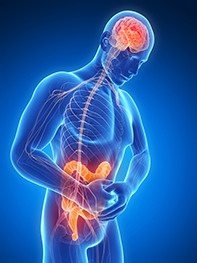Peer Reviewed
Gastroenterology clinic
Irritable bowel syndrome: what to do when dietary manipulation fails
Abstract
Dietary interventions, particularly low-FODMAP diets, are commonly recommended as initial therapy for irritable bowel syndrome; however, a significant proportion of patients respond suboptimally or are unable to comply with long-term dietary modification. If appropriate dietary therapy has failed, pharmacological interventions should be targeted at the dominant symptoms. Psychological therapies may also be a useful adjunct.
Key Points
- A positive diagnosis of irritable bowel syndrome (IBS) can be made in the presence of the characteristic symptoms of abdominal pain and altered bowel habit. Simple blood and stool tests should be performed to exclude conditions that may present with similar symptoms (Box 1). IBS can be further subtyped based on the predominant symptom. Subtypes include IBS with diarrhoea (IBS-D), IBS with constipation (IBS-C) and mixed type (IBS-M).
- A vast spectrum of severity can be seen in cases of IBS. Most cases can be appropriately managed in the primary care setting without referral provided the principles of management are understood.
- Visceral hypersensitivity is a common feature of IBS and is characterised by abnormal processing of central and peripheral pain.
Remember
Picture credit: © Sebastian Kaulitzki/Shutterstock.
Purchase the PDF version of this article
Already a subscriber? Login here.

